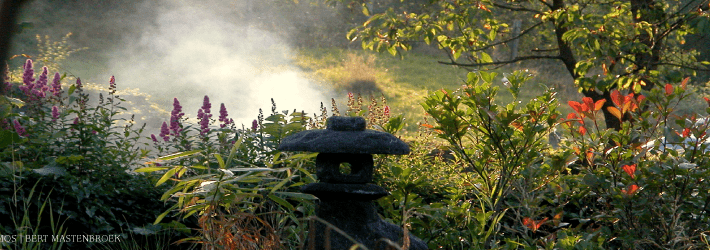Selective Silence
~ A text by Yoginâm ~
Listening to music in a hall, together with other people, is a very different experience than listening to the same music at home. This is not because of the auditive quality of the music, because recordings may have a better quality than a live concert. Something else is happening. In the same way people gather in order to hear a speaker, whereas the message could just as easily be distributed on paper or in mail.
The Causal Link
What is happening in gatherings is the activation of the causal link. The causal link is what I have also called Soul. It is that unconscious dimension of our being that determines what we are. It determines the way we experience ourselves and in reflection experience life. Establishing a causal link is stronger and as memory more durable, than absorbing some information from paper.
Silence in a group
In human communication the causal connection is the only thing that matters. In the way the apes are fleeing each other in company, we talk. The content of what is talked about is secondary to the talking itself. The talking is a mean through which a causal connection is established or re-established. A silence in a group of total strangers does not feel uncomfortable because there is no expectation of a causal sharing. Neither does silence with people you know very well feel uncomfortable because when the causal sharing is strong it does not need to be reaffirmed. Silence in a group of acquaintances is however often awkward because there is a natural inclination to affirm the causal sharing.
Causal sharing and talking
When you explore LivingNâm you may come to a point in which you become aware of the crucial importance of the causal dimension for what you are and consequently for how you experience the world. When you do so, you will start realizing in what way a lot of talking is actually disturbing your causal sharing.
Degeneration to a comical activity
Some people who live together may want to explore silence, this however often degenerates in the comical activity of writing notes to each and even sometimes entering extensive written discussions. Such choices generate the wrong resonance and they activate arrogance and ego-eccentricity.
The university of knowing yourself
In exploring LivingNâm, knowing yourself is not a matter of discovering all your peculiarities, characteristics and hidden programs. Such knowing are the preliminary steps, it is like the primary school. The university of knowing yourself is the gradual awareness that there is nothing to know about yourself, and that in true knowing this self annihilates. From searching for many answers to your single question of knowing yourself, you will arrive at realizing that there is only one single answer to all your possible questions. This is called wisdom.
Living in Silence
Living in Silence is a powerful tool. It is however only appropriate for hermits and for instance for specific retreats in which you observe silence in a group for a specific period of time. When Living in Silence is applied during a retreat in which you interrupt ordinary living it has a great transforming capacity, particularly because afterwards you have to resume your ordinary life again.
Selective Silence
For those who are seriously involved in the search for Transcendental, spiritual Living, and for those who involve themselves in LivingNâm, I want to introduce the powerful instrument of Selective Silence.
The Principle of Selective Silence
The principle of Selective Silence is rooted in the nature of experience and in the pivotal importance of the causal, or Soul, dimension for how we experience. Our life, our death and our post living is determined by the way we share in the causal dimension of being. I have often compared this causal dimension to a garden of which we are the gardener. The causal dimension 'happens' outside our conscious field, we can only tend to it in an indirect manner.
The purpose of Selective Silence
We manage the garden of our causal dimension by managing our resonance. Involving in too much senseless verbal communication is disturbing our causal connection because talking is an activity of the Mind dimension, consequently talking keeps us attuned to the conscious mind dimension. This may confuse and even disturb our causal sharing.
When in the search for Transcendental, Spiritual Living we are exploring the true nature of experience we will gradually become aware of our own transcendental nature in which our causal sharing is much more important than our conscious activities. The gardening of our causal garden becomes paramount, only then will the realization in Abbah* emerge. Selective Silence is both a consequence of increased awareness and it is an instrument for activating the awareness of the true nature of our being.
The Practice of Selective Silence
The practice of Selective Silence is to employ silence in an active way. In no way should Selective Silence be linked to a rejection, an escape or on imposing your choice of silence on others, because that would generate the wrong resonance and it would make Selective Silence useless.
Selective Silence is a choice whether or not to restrict verbal communication. Verbal communication may at times be necessary in order to share relevant information. It may also be something that is socially required, when you are out shopping or when you meet acquaintances. The choice to restrict verbal communication is made in the realization that causal communication is much more essential and at times much more effective than verbal communication. In Selective Silence you do not reject the other, nor do you ignore the other, the opposite is true. In Selective Silence you enter in a closer communication with the other than in verbal communication, because you actively open yourself to the causal dimension in which you both intimately share. Selective Silence is therefore a more intense way of communication than verbal communication.
Selective Silence is valuable when it is rooted in a choice to restrict verbal communication to what is necessary. For instance you may acknowledge something that somebody says in a friendly way with a few words. You could also enter a conversation in which you feel the need to share your viewpoint on the matter, while it does not really matter for the actual outcome, particularly when it is only an exchange of opinions. Expressing your opinions about matters with which you are not directly linked in activity, is always and exclusively a demonstration of 'self-embellishment' . Self-embellishment is obscuring our causal sharing because it is centered in the 'I' illusion.
Chit-chat is always an exchange of opinions. It is generally a discussion about likes and dislikes. Once you realize in what way this affects your causal sharing, it should be a natural decision to stop wasting your time, even if it seem to provide satisfaction. Serving and sharing are natural attributes to people who realize their transcendental nature. Your serving and sharing is obstructed by verbal communication and is only carried by means of the causal component. In Selective Silence you merely concentrate on the causal component and you restrict the verbal aspects to a minimum.
Selective Silence is a choice that you make
Selective Silence cannot be imposed on others, you cannot forbid others to talk with you. This is not what Selective Silence is about. This would generate the wrong resonance. Selective Silence is a choice that you make. It is your choice about how to react to the communication of others. It is your choice whether you enter in a long discussion about your points of view or whether you acknowledge the other's point of view with a friendly nod. You should realize that Selective Silence is useless as a tool when in any way it involves unfriendliness or disregard of others. Selective Silence is not about less communication it is about better and more intense communication.
Complete and Selective Silence
A group of people who live together or who share some time together may decide to observe complete silence for a particular period of time. Such a complete silence is selective in the way that it is based on an agreement that all the participants agree upon beforehand.
* Abbah is a revealed sound. It is not a name because there is nothing that can be named. It is not defined as something. The sound when expressed relates to an infinite essence that is the core of being. This essence emerges with the realization that human rationality and the human need for understanding veils it, as understanding itself is of Abbah. We can understand the ‘how’ of living. The ‘that’ of living is beyond understanding because the understanding itself is the movement of living. The sound Abbah indicates that mystery.


